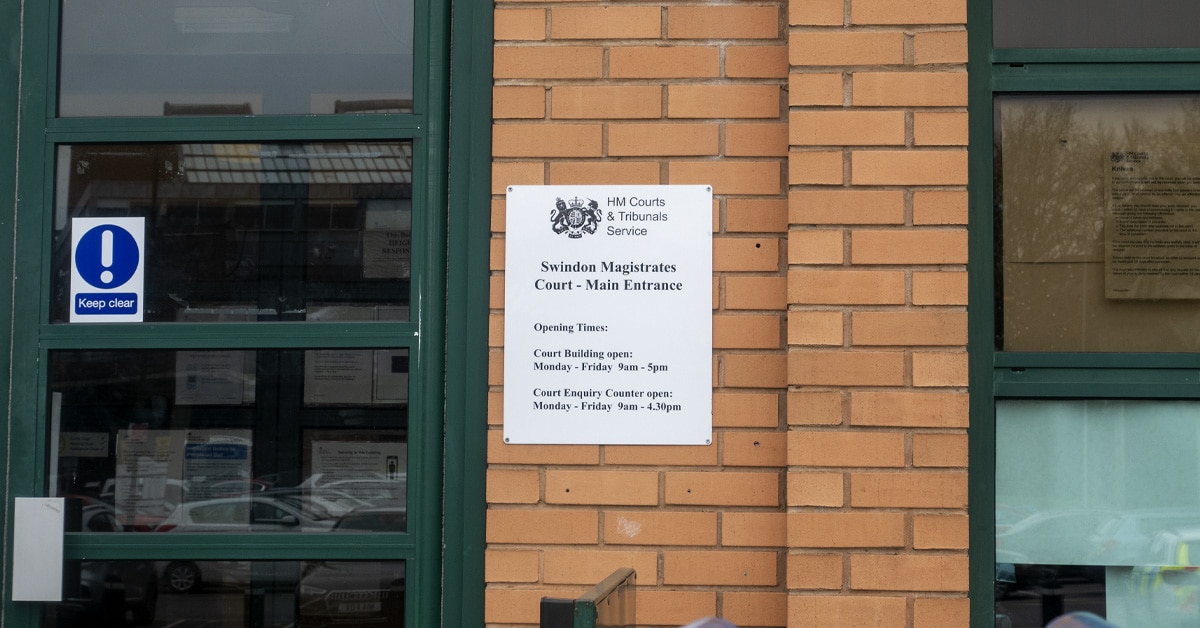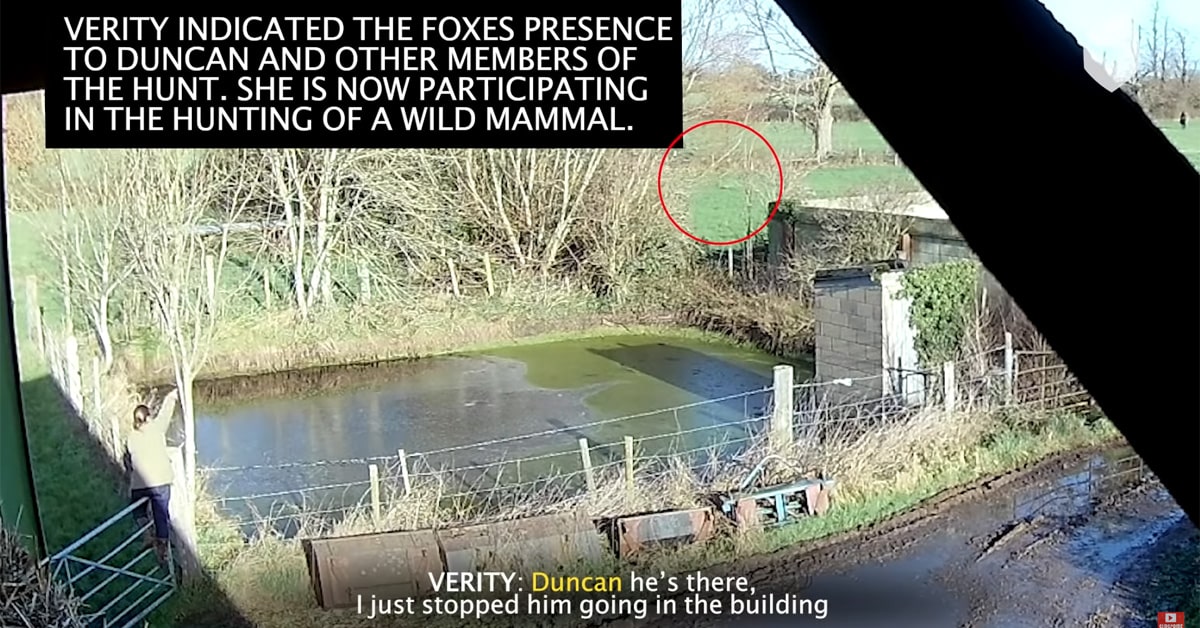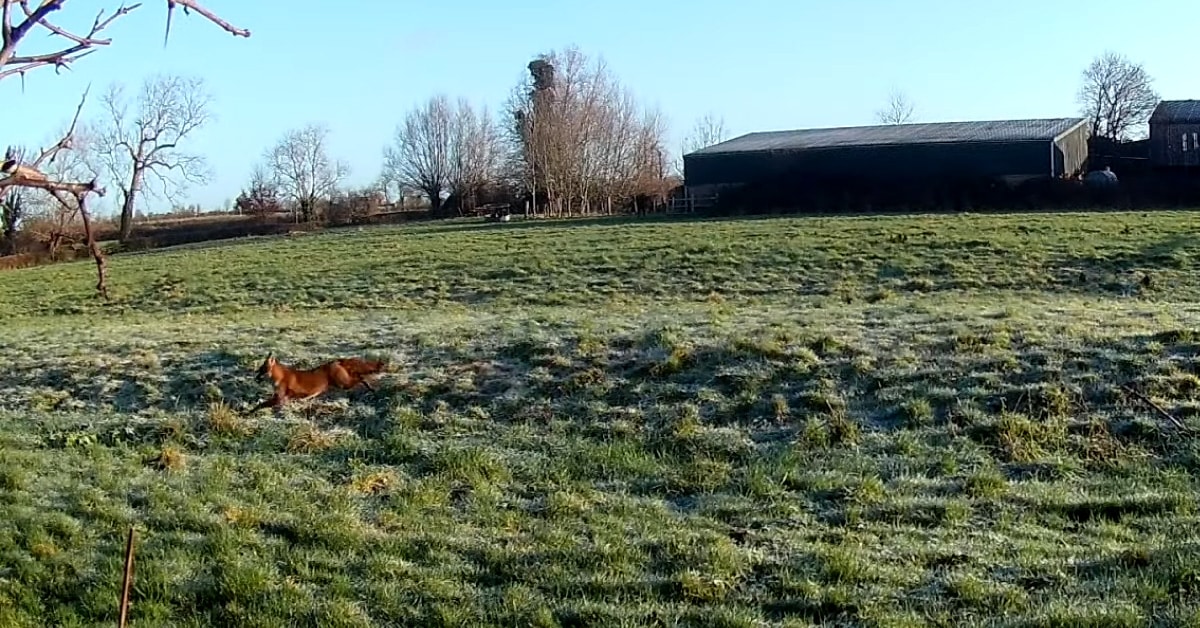Swindon magistrates dismissed the case against Duncan and Verity Drewett due to a series of apparent errors by Wiltshire Police and Wessex Crown Prosecution Service (CPS).
Two people associated with the Vale of White Horse Hunt were due to have a trial at Swindon Magistrates’ court on 20 March. The case related to footage obtained by the Hunt Investigation Team (HIT) on 5 January 2022, which in part showed the Drewetts aiding the Vale of White Horse Hunt in chasing a fox. The hunting took place on land owned by the Drewetts. It also showed two terriermen actively searching for the fox before the hunt arrived, as well as talking about having previously bolted the fox.
As a result of the evidence, Wiltshire Police brought two Hunting Act charges each against the Drewetts: Section 1, which is a charge of illegal hunting; and Section 3, which makes it illegal for a landowner to knowingly permit illegal hunting on their land. A Section 1 charge was also initially brought against Sophie Scruton, a master of the hunt. However, by the time the case reached court, the CPS had dropped the charge against Scruton, and it had dropped the Section 3 charge against Duncan Drewett.
However, a number of apparent errors by Wiltshire Police and Wessex CPS meant that the pair walked out of court without the trial going ahead.
A series of unfortunate events
Prosecuting barrister Thomas Powers initially appealed for an adjournment. He cited an inability by one witness to attend due to unforeseen circumstances, something the witness had informed the CPS of on 1 March. However, the CPS had failed to inform the defence until 17 March. Similarly, Powers himself had only taken on the case on 17 March after the previous barrister had fallen ill. Furthermore, neither PC Marc Jackson – the officer responsible for the case – nor the digital video expert responsible for compiling footage for the defence had been notified of the court date. As a result, they weren’t available to appear in court.
Stephen Welford, the defence lawyer, said that the CPS hadn’t served the defence with video evidence or witness statements until 17 March. He pointed to an error in the evidence logging system that showed evidence as having been sent, when in fact it hadn’t. Powers had earlier said that the case “rests” on the footage, making this a particularly contentious factor. Moreover, with one HIT witness unable to attend, the defence couldn’t cross-examine them.
It’s worth noting at this point that Powers and Welford cited this lack of witness as a reason to either adjourn or dismiss the case respectively. However, Protect the Wild spoke with a second member of HIT – who was also involved in gathering the footage – that was present in the court building as a witness. They confirmed they were in a position to accurately answer any questions that may have been put to the initial witness. No mention of this second witness was made by either party during the appeal to the magistrates.
“It doesn’t get more summary than a Hunting Act offence”
Welford went on to emphasise a number of points in an attempt to have the case thrown out:
- The Drewetts are of “previous good character”.
- Delays by Wiltshire Police in taking statements: it first contacted the Drewetts in March 2022, but didn’t interview them until May.
- It has taken over a year for the case to reach court.
- The impact of these delays on Verity’s precarious mental health.
Underlining all of these factors, Welford said, was the ‘lack of gravity’ of offences under the Hunting Act. He highlighted that such cases are summary-only and non-recordable, telling the magistrate that:
“[It] doesn’t get more summary than a Hunting Act offence.”
Welford then used the CPS v Picton 2006 case law to justify why dismissing the case was preferable to adjourning it. However, the court clerk later pointed out that this was superseded by Criminal Practice Direction No. 8.

Welford also gave some clue as to the defence’s strategy had the case gone ahead. He said there was “no evidence” of the hunt pursuing the fox seen in the footage, nor had Wiltshire Police questioned hunt staff about the incident at any point. Welford minimised the Drewetts’ involvement, describing them as “farmers”, when Duncan Drewett is in fact part of the Vale of White Horse Hunt committee. The lawyer also minimised the Drewetts’ actions. While video showed them as guiding the hunt towards the fox, Welford said simply that:
“Mrs Drewett reacts to that fox, Mr Drewett reacts to that fox.”
However, HIT told Protect the Wild that the raw footage contained clear evidence of hounds onto the line of the fox.
Powers, the prosecuting barrister, offered no further statements to try and have the case adjourned.
The court clerk informed the magistrates that, if the case was adjourned, the next available date would be in July. Taking all of the aforementioned factors into consideration, the magistrates decided in less than a minute to dismiss the case.
Outstanding questions
There are some outstanding questions about the handling of this case by both Wiltshire Police and Wessex CPS:
- Why had PC Jackson, who had taken on the case from the beginning, not been informed of the court date?
- Why had the CPS dropped both the case against Scruton and the Section 3 charge against Duncan Drewett, thereby piling the majority of the case onto the vulnerable Verity?
- Why did Wiltshire Police not question either the hunt staff or the terriermen?
- Why did the CPS only send evidence to the defence on the Friday before the Monday court case?
- Why was no mention made of the second HIT witness?
It’s important to understand that the outcome of this case isn’t the same as a not guilty verdict. It’s a ‘technical KO’ resulting from a number of questionable decisions and administrative errors made by Wiltshire Police and Wessex CPS. In this respect, it is similar to the dismissed case against Charles Carter, huntsman of the Royal Artillery Hunt, who narrowly escaped a trial after Ministry of Defence Police missed an evidence submission deadline by a day.

What’s really going on?
Following the case’s dismissal, HIT told Protect the Wild that:
“The intelligence and evidence was brilliant, so we need to keep Wiltshire Police under pressure on this. We need to keep asking it why the case didn’t go to court.”
Wiltshire Hunt Saboteurs has repeatedly exposed Wiltshire Police for its proximity to local hunts. In December 2021 it revealed that PC Laura Hughes, who was filmed turning her back on hunt supporters attacking anti-hunt protesters during a Boxing Day parade of the disgraced Avon Vale Hunt, was herself a rider with the Avon Vale Hunt. Then, in February 2023, it exposed Cheryl Knight as a regular hunt rider. Wiltshire Police had just appointed Knight as an officer in its Rural Crime Team. The sab group also shared a post highlighting a number of other connections between Wiltshire’s policing system and hunting community.
With all of these embedded connections, we all need to ask the same question as HIT: Why didn’t this case make it to court?
You can donate to Hunt Investigation Team through its GoFundMe page.
Featured image via Hunt Investigation Team

